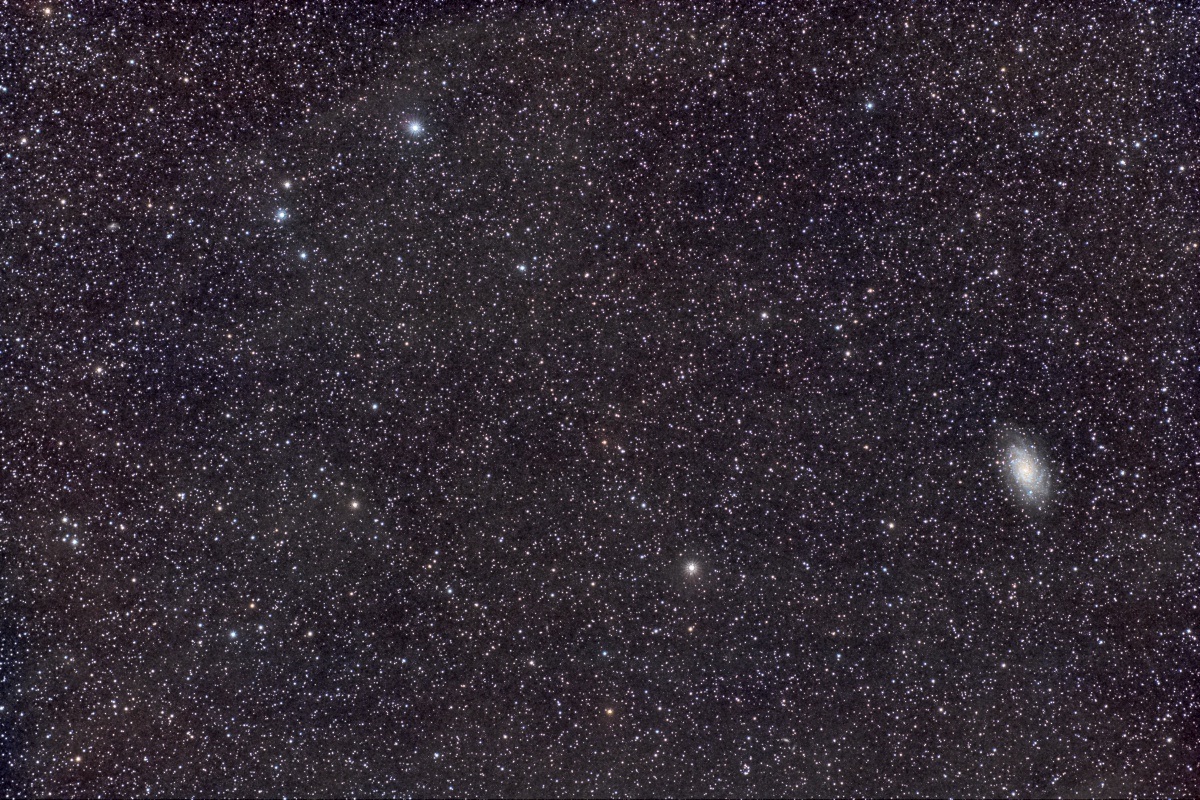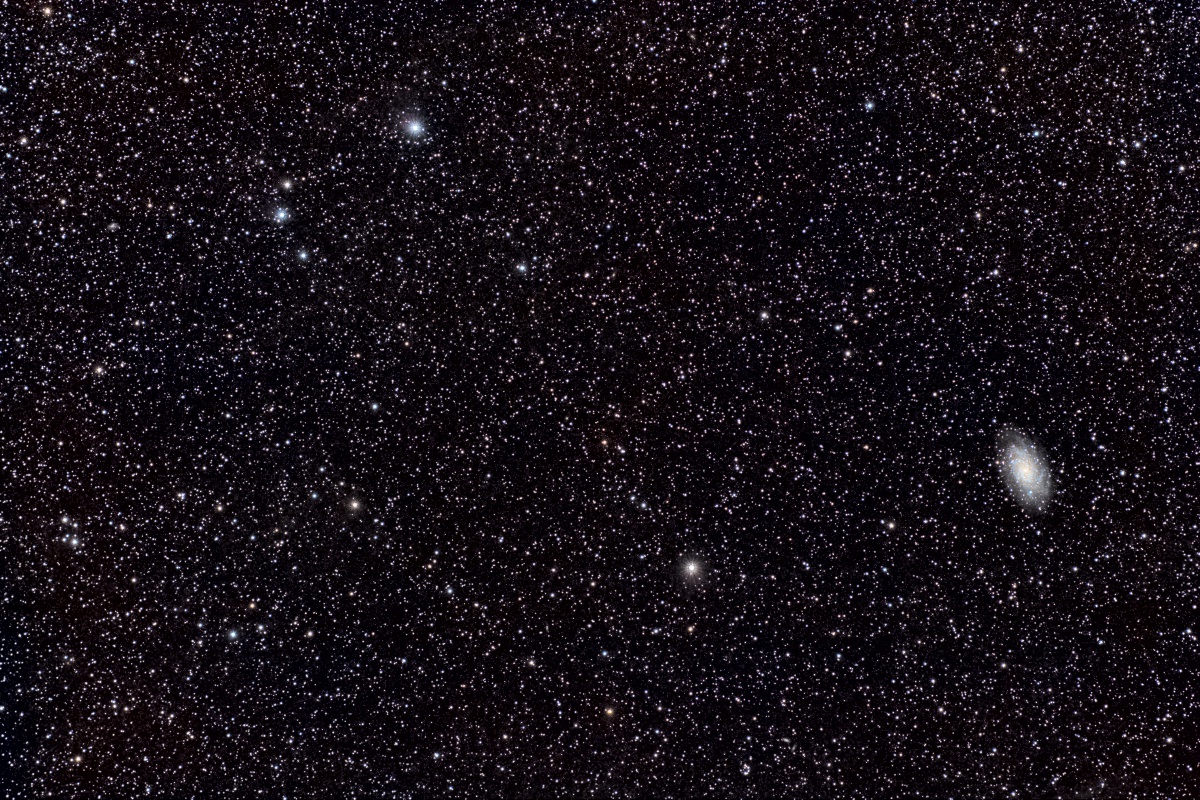I subscribed to Adam Block’s online tutorials and have been working my way through them. It’s a long, slow process. He’s incredibly thorough, sometimes painfully so, though I supposed that’s better than the opposite (skimming over things so fast you can’t follow along). So while I’m nowhere near finished with the tutorials, naturally I had to give some of the things I learned a try. Mostly this was along the lines of play with the settings for some of the processing to figure out what exactly it does. That’s slow and tedious, too, but it helps to realized that processing my images from an 85 mm focal length lens is going to be quite different than processing my images from a 250 mm focal length lens.
So, we’re back to Triangulum and the M33 region. I couldn’t help but notice that there were hints of dust clouds in the field. Years ago, I would have seen those faint smudges and concluded I had done a bad job calibrating the images and worked hard to “fix” that. I’ve come to realize that the “inky black” of space is only sort-of true. Alas, getting good images of that dust is hard and I have not succeeded here.
So here’s a do-over of the image processing from my last post. I started from the same initial RGB channel combination but then went down a slightly different path to my final images. Both have had the stars de-emphasized, which probably contributes to some of the apparent dust (i.e., it’s not completely real, it’s partially smudged stars). One has had the black point shifted so that the dust mostly disappears, the other plays games with emphasizing the stuff just above the black point to emphasize the dust.
| Object | Triangulum Region with M33 |
| Camera | Canon T6i, Hap Griffin Modified, no filters |
| Lens/Scope | Rokinon 85mm f/1.4 @ f/4 |
| Exposure | 64 x 2 min. |
| Location | RAC Star Haven |
| Processing | PixInsight |
This is 124 minutes at f/4. I’m slightly disappointed. I had seen an image in Sky & Telescope of the region from Pleiades to the California nebula which was an 85 mm (on a full frame sensor), 66 minutes at f/2.8 that has well-defined dusty lanes. That image did not specify the ISO setting, but starting around ISO 800+, most of the recent EOS line are effectively ISO-less. So I was expecting that my exposure would show similar definition. Of course, it’s not the same area of the sky, so maybe the dust is just dimmer here and I need more exposure. A lot more exposure.
The Rokinon 85mm isn’t really completely sharp at f/4. That could be a focus issue, though the stars seem pretty well focused in the images. I do have some chromatic aberration. I though I could take that out by realizing the RGB channels after the integration, but trying that didn’t show any reduction. Oh well. I’ll have to take more pictures.
Written by Roland Roberts
Search
.Archives
- May 2025 (1)
- October 2024 (1)
- May 2024 (2)
- April 2024 (3)
- September 2022 (5)
- April 2022 (1)
- January 2022 (3)
- December 2021 (4)
- September 2021 (3)
- July 2021 (1)
- January 2021 (1)
- November 2020 (2)
- October 2020 (2)
- September 2020 (2)
- August 2020 (5)
- July 2020 (1)
- November 2019 (2)
- September 2019 (1)
- August 2019 (2)
- September 2017 (1)
- August 2017 (1)
- September 2015 (3)
- August 2015 (2)
- June 2015 (5)
- May 2015 (3)
- May 2013 (2)
- January 2013 (1)
- December 2012 (2)
- September 2012 (1)
- June 2012 (1)
- May 2012 (1)
- October 2011 (2)
- September 2011 (2)
- April 2011 (2)
- March 2011 (10)
- January 2011 (8)
- November 2010 (2)
- October 2010 (1)
- September 2010 (3)
- August 2010 (2)
- July 2010 (1)
- June 2010 (1)
- April 2010 (3)
- February 2010 (3)
- January 2010 (3)
- December 2009 (6)
- November 2009 (3)
- October 2009 (7)
- September 2009 (8)
- August 2009 (4)
- July 2009 (1)
- June 2009 (2)
- May 2009 (2)
- April 2009 (7)
- March 2009 (1)
- February 2009 (6)
- January 2009 (4)
- December 2008 (4)
- November 2008 (3)
- October 2008 (11)
- September 2008 (4)
- August 2008 (5)
- July 2008 (5)
- June 2008 (2)
- April 2008 (4)
- March 2008 (18)
- February 2008 (9)
- November 2007 (1)
- October 2007 (3)
- July 2007 (3)
- April 2007 (1)
- March 2007 (6)
- February 2007 (3)
- December 2006 (3)
- October 2006 (4)
- September 2006 (1)
- July 2006 (5)
- May 2006 (10)
- April 2006 (9)


